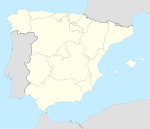Rojales
| Rojales municipality | ||
|---|---|---|
| coat of arms | Map of Spain | |

|
|
|
| Basic data | ||
| Autonomous Community : | Valencia | |
| Province : | Alicante | |
| Coordinates | 38 ° 5 ′ N , 0 ° 43 ′ W | |
| Height : | 8 msnm | |
| Area : | 27.60 km² | |
| Residents : | 16,963 (Jan 1, 2019) | |
| Population density : | 614.6 inhabitants / km² | |
| Postal code : | 03170, 03177 | |
| Municipality number ( INE ): | 03113 | |
| administration | ||
| Website : | www.rojales.es | |
Rojales is a municipality in the province of Alicante ( Spain ). It is located on the southern Costa Blanca , in the Vega Baja district and on the Segura River . Most of the population lives in Ciudad Quesada (9,061 inhabitants). It is a residential area in which mainly foreigners live.
Rojales is the Spanish municipality that has the second highest proportion of foreigners (according to the census) with 65.23 percent.
history
The history of the city of Rojales has both Arabic and Christian roots. The festival of Moros y Cristianos , which is celebrated in the summer months, testifies to this even today. The foundation stone of the irrigation network that still exists today fell during the time of Arab rule. With locks and bucket wheels in the Segura River, agricultural use began in Rojales in the Middle Ages. The parish belonged to the town of Guardarmar del Segura until May 29, 1773. The Segura river plays a role in the history of Rojales, because the residents of Rojales have often experienced floods in the past, especially those of 1879 (6.54 meters), 1946, 1948, 1973 (5.60 m), 1982, 1987 and 1989. Tectonic movements caused a catastrophe on March 21, 1829. An earthquake of 6.2 degrees on the Richter scale was measured in the region. 30 people died in Rojales, 34 were injured, 319 houses were destroyed and 81 houses were damaged.
Demographics
In recent years Rojales has seen strong demographic growth (136 percent increase between 1995 and 2005). The reason for this is the influx of many European foreigners. Rojales is the Spanish municipality that has the second highest proportion of foreigners with 65.23 percent (according to the census). The city was only surpassed by the neighboring town of San Fulgencio with a proportion of foreigners of 65.25 percent; the British make up the largest group of inhabitants (4,668 inhabitants, 33.81 percent of the total population compared to 4,798 Spanish inhabitants). The third largest group are the Germans with 1054 people.
Most of the population lives in Ciudad Quesada (with 9,061 inhabitants). Ciudad Quesada is a residential area in which mainly EU foreigners live, but is also considered a stronghold of the Swiss on the Costa Blanca.
Attractions
The most important monuments are the church, the wheel, the dam and the stone bridge that goes over the Segura. This bridge has three arches and was built during the reign of Carlos III. It was completed on October 23, 1790. Another interesting place are the caves on the right side of the river, where painters and artists live nowadays. Numerous cultural events such as picture, photo or sculpture exhibitions and concerts invite you to visit.
Sports
In Rojales there is the old Club Deportivo (sports club) Thader, which plays in the first regional league group (IV). The Sport-Club Thader has a youth club (CD Thader B). This plays in the 2nd regional league.
There is also a basic soccer school in Rojales (Pre-Benjamin, Benjamin, Alevín, Infantil, Cadete and Juvenil). Children from the age of 6 play there and wait for a chance at the age of 19. Thader plays in the urban stadium, which was formerly called "Francisco Franco" - it is located in the sports complex on C /. Lemonar. The sports facility has the following facilities: a covered hall, 3 soccer fields (1 field with grass, 1 field with earth, 1 field with artificial turf (ending April / 2007)), a boules field, a facility for Olympic shooting, swimming pools, One hall each for football and basketball, and a children's playground.
sons and daughters of the town
- Moi Gómez (* 1994), football player
Web links
Individual evidence
- ↑ Cifras oficiales de población resultantes de la revisión del Padrón municipal a 1 de enero . Population statistics from the Instituto Nacional de Estadística (population update).


